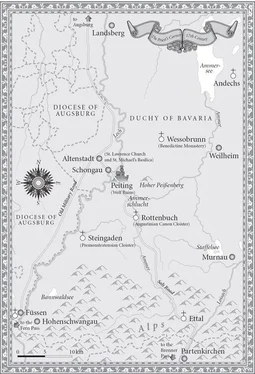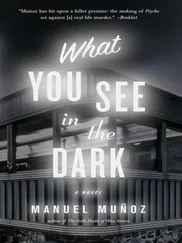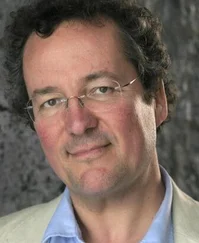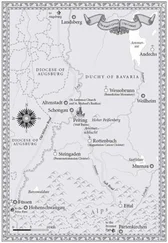Oliver Potzsch - The Dark Monk
Здесь есть возможность читать онлайн «Oliver Potzsch - The Dark Monk» весь текст электронной книги совершенно бесплатно (целиком полную версию без сокращений). В некоторых случаях можно слушать аудио, скачать через торрент в формате fb2 и присутствует краткое содержание. Жанр: Исторический детектив, на английском языке. Описание произведения, (предисловие) а так же отзывы посетителей доступны на портале библиотеки ЛибКат.
- Название:The Dark Monk
- Автор:
- Жанр:
- Год:неизвестен
- ISBN:нет данных
- Рейтинг книги:5 / 5. Голосов: 1
-
Избранное:Добавить в избранное
- Отзывы:
-
Ваша оценка:
- 100
- 1
- 2
- 3
- 4
- 5
The Dark Monk: краткое содержание, описание и аннотация
Предлагаем к чтению аннотацию, описание, краткое содержание или предисловие (зависит от того, что написал сам автор книги «The Dark Monk»). Если вы не нашли необходимую информацию о книге — напишите в комментариях, мы постараемся отыскать её.
The Dark Monk — читать онлайн бесплатно полную книгу (весь текст) целиком
Ниже представлен текст книги, разбитый по страницам. Система сохранения места последней прочитанной страницы, позволяет с удобством читать онлайн бесплатно книгу «The Dark Monk», без необходимости каждый раз заново искать на чём Вы остановились. Поставьте закладку, и сможете в любой момент перейти на страницу, на которой закончили чтение.
Интервал:
Закладка:
“Uncle Simon, did you bring me something from the marketplace?” she asked. “Prunes or honey cakes? Please say you did!”
The medicus laughed and put the girl down. Whenever he went to browse through Jakob Schreevogl’s library, he paid a visit to Clara as well. Usually, he had a little present for her: a top, a carved wooden doll, or a candied fruit with honey.
“You’re like a leech, do you know that? And one with a sweet tooth, too!” He stroked her hair gently. “This time I haven’t come with anything. Look in the kitchen and see if the cook has a few dried apples for you.”
Clara walked away, pouting. Footsteps now could be heard on the wide spiral staircase that led to the upper floors. Jakob Schreevogl approached Simon in his bathrobe and slippers. The alderman had wrapped a scarf around his neck. He was pale and had a light cough, but his face brightened when he caught sight of Simon.
“Simon! What a pleasure to see you!” he called from the stairway, spreading his arms out. “In this beastly cold, anyone who will pay a visit inside these four walls and help to pass the time is welcome.”
“It looks like what you need is rest and a good doctor,” Simon replied with some concern. “As luck would have it, there happens to be one present. Shall I perhaps…” He reached for his doctor’s bag, which he had been dragging around with him since the morning, but Schreevogl waved him off.
“Oh, come now! It’s just a simple cold. Half the town is sicker than I am. Let’s hope at least that the good Lord will spare our children.” He winked at the medicus. “In any case, I don’t think you’re here for a boring house call. But do come with me to the library. There’s a nice warm fire in the stove, and if you are lucky, there will be some of this black devil’s brew left.”
Simon followed him upstairs, animated by the prospect of a cup of hot coffee. He had introduced Jakob Schreevogl to the pleasure of this trendy new beverage. Two years ago, the young medicus had first purchased the brown beans from an Arabian street vendor and since then had become addicted. And now he had apparently hooked the patrician Schreevogl on it as well. Together, they had enjoyed veritable coffee orgies in the library. After the third pot, even tedious theologians like Johann Damascenes or Petrus Lombardus began to make sense.
Simon entered the library and looked around. A little cast-iron stove was glowing in one corner of the wood-paneled room, and book after book lined the walls on gleaming cherrywood shelves. Jakob Schreevogl was well-to-do. His father had taken a small stove-fitting business and grown it into the leading one in the area. Since the death of his father, young Schreevogl had invested a considerable portion of his money in his book collection, a passion he shared with Simon.
The patrician offered him a chair and poured him a steaming cup of coffee. Jakob Schreevogl was a big man and, like all Schreevogls, had a pointed, slightly hooked nose that nearly hung down into his coffee. As the young alderman slurped the hot brew, Simon inquired about the aldermen’s meeting that had taken place that morning. He knew that important topics had been on the agenda.
“So, did the city council make any decision on how to proceed with these gangs of murderers?”
Jakob Schreevogl nodded earnestly. “We’ll no doubt send out a patrol to search for the robbers.”
“But you’ve done that once before!” Simon interjected.
“I know, I know,” Schreevogl sighed. “But this time it has to be well thought out and needs a competent leader. We’re still considering who might be the right person for that.”
Simon nodded. The matter was too serious to be entrusted to a few drunken village constables. For weeks, a band of robbers had been ravaging the countryside. A merchant and two farmers had been attacked. The highwaymen had slain the merchant, and the two farmers had just managed to escape. There were at least a dozen men, they reported, some with crossbows and a few with muskets, even. In other words, a real danger, if not for the city, then at least for the surrounding area.
“If the aldermen can’t get their hands on these scoundrels soon, we’ll have to ask Munich to send soldiers.” Jakob Schreevogl cursed under his breath and blew into his hot cup of coffee. “But the council wants to avoid that at all costs. Soldiers cost money, as you know. But forget about politics,” he said, waving his hand dismissively. “It bores me. You have certainly come for a different reason.”
“Indeed,” Simon replied. “I’m looking for a book-or rather, for a quotation in a book that I think I’ve read here.”
“Aha, a book!” Jakob Schreevogl smiled. “I’m pleased that you enjoy my library so much. So tell me, how does the quote go?”
“ Non nobis Domine, non nobis, sed nomini tuo da gloriam, ” Simon repeated from memory.
The patrician stopped to think. “Where did you read this?”
“In the little church of Saint Lawrence in Altenstadt.”
“ Not to us, o Lord, not to us, but to Thy name be the honor, ” Jakob Schreevogl mumbled, furrowing his brow. “Strange. I believe that’s the motto of the Knights Templar.”
Simon had to cough when his coffee went down the wrong way. “The Templars?” he asked finally.
Schreevogl nodded. “It was their battle cry.”
Suddenly, the alderman’s brow furrowed again-he seemed to remember something. Quickly, he stood up and walked over to a shelf near the stove. “Now I know the book you mean!” he said. After a few minutes of searching, he took out a little leather-bound book no larger than the palm of a hand. “Here!” he exclaimed, handing it to Simon. “It’s in this treatise by Wilhelm von Selling. Ordinis Templorum Historia. An ancient, strange book. Selling was an Englishman, a Benedictine monk who, in contrast to the church, tried to keep the memory of the Templars alive. He wrote this book more than two hundred years ago, but even at that time, the Templars had been confined to history for a century.
Simon nodded as he leafed through the well-worn tome. Some pages apparently had been ripped out, moisture had curled others, and some were scorched. The book was written in Latin with embellished initials and was not printed, but handwritten. It looked like the book had been through a lot in its long life.
“At that time, I just skimmed the book,” Simon said, “but I remember the words. Tell me more about these…Templars.”
Jakob Schreevogl sat down again and sipped his coffee. It was a while before he began to speak. Outside an ice storm beat against the windowpanes.
“Their full name is a bit longer-The Poor Knights of Christ and of Solomon’s Temple. Much that we know of them is, perhaps, only a legend.” The patrician settled back in his chair as he continued speaking. “One thing is certain, however. The Templars were the most powerful and richest organization that the world has ever known. They started out as a small order of knights during the Crusades whose actual purpose was to protect pilgrims on their way to Jerusalem. Until then, the order was a unique mix of knights and ascetic monks. But through clever tactics and the right support, the group spread across all of Europe in a few decades. Branches were everywhere. If a person wanted, he could purchase a bill of exchange in Cologne and redeem it in Jerusalem or Byzantium. The order answered only to the Pope and was thus, in fact, sacrosanct. Through clever financial policies, the Templars gradually became richer than kings or emperors, and that would finally be their undoing…”
“What happened?” Simon asked curiously, pouring himself another cup of coffee.
“Well, it happened as it so often does.” Jakob Schreevogl shrugged almost apologetically. “The French King Philip IV had designs on their fortune. In the dead of night, he was able to arrest every Templar in all of France. He accused them of engaging in sodomy and satanic rites, bought witnesses, and extracted the necessary confessions through torture. Finally, even the church dissociated itself from the Templars. The pope could no longer support them and, in the end, let them fall. Their last Grand Master, to the best of my knowledge, was burned at the stake in Paris, and within a few years, the mightiest lords and masters of Europe became powerless victims. The Templars who were unable to go into hiding in time were pursued and killed. And all that after they had helped to shape the destiny of Europe for nearly two hundred years!”
Читать дальшеИнтервал:
Закладка:
Похожие книги на «The Dark Monk»
Представляем Вашему вниманию похожие книги на «The Dark Monk» списком для выбора. Мы отобрали схожую по названию и смыслу литературу в надежде предоставить читателям больше вариантов отыскать новые, интересные, ещё непрочитанные произведения.
Обсуждение, отзывы о книге «The Dark Monk» и просто собственные мнения читателей. Оставьте ваши комментарии, напишите, что Вы думаете о произведении, его смысле или главных героях. Укажите что конкретно понравилось, а что нет, и почему Вы так считаете.












